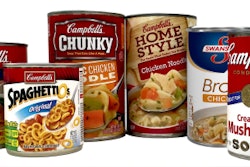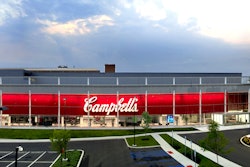
Campbell Soup Co. will increase its organic offerings and remove artificial ingredients from soups. The company recently provided an update on the key strategic imperatives. Led by President and Chief Executive Officer Denise Morrison, executives outlined important actions the company is taking to reshape Campbell and improve its growth trajectory by strengthening its core business and expanding into faster-growing spaces. This includes Campbell’s plans to change many of its recipes, to build stronger connections with consumers and to increase the company’s focus on faster-growing categories, such as health and well-being and developing markets.
Campbell continues to increase its focus on faster-growing categories, such as health and well-being and packaged fresh, while also innovating on its core business portfolio.
Morrison said, “Campbell is taking unmistakable action to reshape our portfolio, redesign our organization and shift our investments so we can move more quickly to meet consumer needs. This approach holds the greatest promise for our company and our shareholders. From the reconfiguration of our portfolio and our focus on cost-savings to the way we connect with today's consumers, I’m confident that the steps we’ve taken, along with those that we plan to take, will set Campbell apart from other food companies.”
Morrison and Americas Simple Meals and Beverages President Mark Alexander outlined plans to help consumers access a wide range of information about how Campbell’s foods and beverages are made and the choices behind ingredients, particularly in its core U.S. soup, sauces and beverages portfolio.
Over the next year, Campbell will expand its efforts to include all major brands in the U.S. and Canada, with plans to expand it globally over the next three years.
“As we transform our marketing efforts and connect with consumers, we will continue to engage people in an open and authentic way to gain understanding about the ingredients and issues they care about,” said Morrison. “We believe it is the right thing to do for consumers, who have an increasing appetite and expectation for this type of candid discussion.”
Campbell is making several key changes to its recipes and outlined plans to increase its organic offerings.
Based on feedback from parents, the company will simplify the recipes of existing condensed soups for kids, removing ingredients such as added MSG and continuing to make the soup with no preservatives, no artificial colors and no artificial flavors. The first updated range of kids soups is expected to hit U.S. shelves in August.
Alexander said, “We know that many parents are seeking products made with simpler ingredients for their children. As a result, we are extending our line of kids soups with organic varieties and simplifying recipes to make them an easy choice for parents ˗˗ and fun for kids.”
The company plans to remove artificial colors and flavors from nearly all of its North American products by the end of fiscal 2018. Additionally, Campbell plans to move away from using high fructose corn syrup in certain products, including the complete line of Pepperidge Farm fresh breads by the end of fiscal 2017, as well as most new products launching in fiscal 2016 in its Americas Simple Meals and Beverages portfolio.
To meet the growing demand for simple food, Campbell will increase its organic offerings with line extensions in its core portfolio. Organic food continues to grow strongly, with annual sales reaching $8 billion, up almost 12 percent over three years on an annualized basis. Building on Campbell’s Organic soups that launched in January, the company will introduce Campbell’s Organic soup for kids in three kid-friendly chicken noodle varieties. Available in August, these new organic soups for kids will be non-GMO and use ingredients sourced from certified American organic farms.
Alexander also outlined plans to expand the Plum line of organic food for babies, tots and kids. In fiscal 2016, Plum will launch GrowWell, a range of purees which provide nutrients from ingredients like chia, Greek yogurt and sunflower seed butter. Plum will also build on the successful Mightyrange of snacks, introducing new Mighty Veggies and Mighty Sticks for tots on-the-go, and further develop its successful MashUps fruit sauce and snacks lines.
Luca Mignini, president of global biscuits and snacks, highlighted Campbell’s plans to launch Pepperidge Farm Goldfish made with organic wheat in fiscal 2016. The current Goldfish whole grain line of crackers will also expand to include new varieties.
Mignini also outlined how Campbell’s newly integrated global biscuits and snacks division will focus on building brands like Goldfish, Tim Tam and Kjeldsens beyond their home markets and across new geographic boundaries. Under the new divisional structure, the company will be better positioned to drive growth by focusing on expanding these brands in developing markets where it has a strong foothold, including Indonesia and China.
The Campbell Fresh division combines recently-acquired Garden Fresh Gourmet with the Bolthouse Farms portfolio and Campbell’s retail refrigerated soups.
Jeff Dunn, president of Campbell Fresh, outlined plans to drive growth by strengthening the core businesses and driving breakthrough innovation in the perimeter. The company is well positioned in high-growth snacking and premium beverages segments, with a portfolio that extends beyond fresh carrots to include refrigerated hummus, salsa, dips, sides, soups and salad dressings, and refrigerated super-premium and ultra-premium beverages.
Dunn said, “We’re focused on driving full force growth to become the go-to resource for packaged fresh innovation throughout the perimeter of the store. We’re actively building our brands and capabilities to leverage the shift in consumer demand for ‘better-for-you’ products and to sustain growth in packaged fresh categories over the long term.”
Dunn also identified critical capabilities that Campbell Fresh will continue to build and invest in over the next few years to connect with the changing food consumer, including high engagement marketing tactics, fresh product innovation and incubation, best-in-class operating and supply chain platforms to support a broader portfolio, and deepened retail relationships.



















